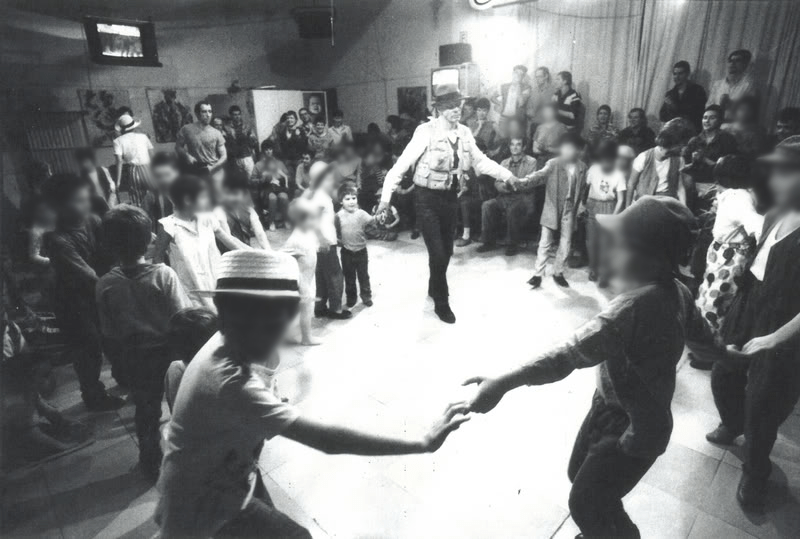With the US Senate banning post-9/11 interrogation techniques, I’ve been doing a little reading on sleep deprivation. As a recently declassified document notes, “At least five detainees experienced disturbing hallucinations during prolonged sleep deprivation.” That got me wondering what those waking nightmares are like and why, scientifically speaking, staying awake for a long time will bring them on. To find out, I contacted Danny Eckert, an associate professor from Australia’s University of New South Wales. Eckert is a specialist on neuroscience and sleep, and as he explains it, we need to sleep because respiring cells release waste chemicals throughout the day.
There’s debate over which of these byproducts contribute to fatigue, but there’s some consensus over one called adenosine. “When people stay awake, adenosine builds up in the brain,” explains Professor Eckert. “And too much of it can cause hallucinations.”
Videos by VICE
If you studied biology in high school you might recall that cellular respiration is the process by which glucose is converted into adenosine triphosphate (ATP), which the body uses as fuel. But what’s really interesting is that adenosine—the molecular backbone of ATP—sends us to sleep. In fact, injecting lab animals with adenosine has shown to induce almost immediate unconsciousness, while stimulants such as coffee simply work by blocking adenosine’s receptor pathways.
Despite this, a lot of scientists disagree on how adenosine might induce hallucinations. In fact, Dr. Sean P. A. Drummond, a neuroscientist from Monash University, insists it would depend on a genetic disposition. “If someone is vulnerable to psychosis, then sleep deprivation might lead to an exacerbation of psychotic symptoms,” he said. “However, for everyone else, that simply does not happen.”
Jess Vlaanderen, on day five of her experiment
Jess Vlaanderen is a New Zealander who has experimented with staying awake for prolonged periods of time. Back in 2012 Jess began researching lucid dreaming and watching a lot of videos by a lucid-dream YouTube enthusiast named Giz Edwards. Giz spent a lot of time discussing the intersection between sleep and hallucinations, which inspired Jess to keep herself awake for nearly 110 hours—around four and a half days—and then post a series of YouTube videos on her experience.
According to Jess, the experiment was mainly to test her own will power and see if it was possible to hallucinate without drugs. She discovered it was. “Some of the visuals reminded me of an ayahuasca experience,” she told VICE. “I felt I’d seen this colorful, complex universe in front of me, although I was awake. It was very surreal.”
It’s like you’re in a cartoon. People and objects become very comical.
Jess also told me she experienced something called a focal seizure, which is usually associated with epilepsy. The US National Library lists symptoms as “staring spells, sometimes with repetitive movements such as picking at clothes or lip smacking,” as well as muscle contractions and memory loss. Indeed Jess admits she has no memory of the seizure, just that “My friend said I was out. Apparently I was shaking my head from side to side and talking to him at the same time. Afterwards I couldn’t stop giggling.”
When I asked her to encapsulate the experience, she said the urge to sleep all the time was crippling, although the visuals were pleasant. “The easiest time had to be the first 24 hours. After that it became harder and harder,” she said. “It’s like you’re in a cartoon. People and objects become very comical, and I hallucinated a lot. Cars floated, shadows hung from trees, zombies ran at me in the street. I felt like I could control the clouds, as they appeared to morph and mutate. And when I went to the supermarket the items on the shelves appeared to follow me. The shelves also felt like they were leaning in and about to fall.”
Jess said she wasn’t afraid of any long-term damage, although she was aware of the risks. As the president of the Australian Sleep Association, Professor Nicholas Antic, told me, sleep deprivation “can certainly be dangerous.” According to him, “sleeping expels waste products from the brain through the lymphatic system, and it’s dangerous for these products to build up.”
While the health effects of sleep deprivation are well known to any conscious being on the planet, most of us don’t think of them as fatal. But In 2014 a devoted Chinese soccer fan died after staying awake for 48 hours while watching the World Cup. In the end a lack of sleep resulted in a brain hemorrhage, which caused a stroke.
The first person to scientifically document a fatal case of sleep deprivation was the Russian physician and scientist Marie de Manaceine. In 1894, she studied sleep-deprived puppies and found that the complete absence of sleep would kill them within days.
Despite these downsides, Jess says she recommends the experience. She says she learned a lot about herself, and her powers of perseverance. “I really didn’t think my mind was capable of staying awake for 110 hours,” she said. And every time I’ve hallucinated, I’ve become more and more familiar with my spirituality. As long as you have a close friend with you, to help you out if things get a bit warped, you should be fine.”
The problem is that it’s just so hard to stay awake, and there are easier ways to get high.
More
From VICE
-

Collage by VICE -

Lauren Levis, who died after taking iboga at the Soul Centro retreat in 2024. (Photo courtesy of the Levis family) -

Image Credit: Natalli Amato -

Children at the Friedrichshof Commune dance with renowned artist Joseph Beuys. Inka, aged four, holds his right hand.